
"The Dead-Beat" is a poem by Wilfred Owen. It deals with the atrocities of World War I.

"The Dead-Beat" is a poem by Wilfred Owen. It deals with the atrocities of World War I.
Owen developed the poem while he was a patient at Craiglockhart, a hospital for officers suffering with mental illness. [1] It was here that he met fellow poet Siegfried Sassoon and where his personal psychological healing from the traumas of war. "The Dead-Beat" marked the beginning of his writings as representations of soldiers who could no longer tell their own stories. [2]
In writing the poem, Owen received help from Sassoon, who he elsewhere called one of his dearest friends. Sassoon's influence is apparent particularly in the poem's anger over injustice. [3] Owen described the experience in a letter in which he suggested that the middle sections needed work. [1] The night he met Sassoon, he began writing "The Dead-Beat", as described in the letter: "After leaving him, I wrote something in Sassoon's style... The last thing he said was 'Sweat your guts out writing poetry!' 'Eh?' says I. 'Sweat your guts out, I say!'" [4] Pat Barker, in her novel Regeneration , describes a fictitious workshop between the poets based on this letter. [1]
Like many of his poems about the war, Owen explored both courage and cowardice in "The Dead-Beat". [5] He also attempts to emulate the vernacular of a common soldier in a realistic war setting. [3] In particular, "The Dead-Beat" depicts how war can isolate rather than unite individuals who share common causes or experiences. [6]
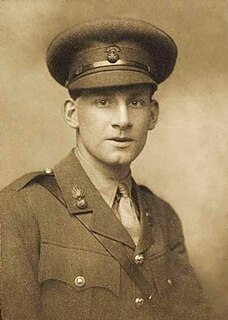
Siegfried Loraine Sassoon was an English poet, writer, and soldier. Decorated for bravery on the Western Front, he became one of the leading poets of the First World War. His poetry both described the horrors of the trenches and satirised the patriotic pretensions of those who, in Sassoon's view, were responsible for a jingoism-fuelled war. Sassoon became a focal point for dissent within the armed forces when he made a lone protest against the continuation of the war in his "Soldier's Declaration" of 1917, culminating in his admission to a military psychiatric hospital; this resulted in his forming a friendship with Wilfred Owen, who was greatly influenced by him. Sassoon later won acclaim for his prose work, notably his three-volume fictionalised autobiography, collectively known as the "Sherston trilogy".
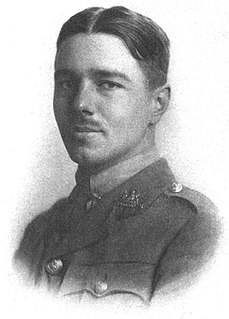
Wilfred Edward Salter Owen MC was an English poet and soldier. He was one of the leading poets of the First World War. His war poetry on the horrors of trenches and gas warfare was much influenced by his mentor Siegfried Sassoon and stood in contrast to the public perception of war at the time and to the confidently patriotic verse written by earlier war poets such as Rupert Brooke. Among his best-known works – most of which were published posthumously – are "Dulce et Decorum est", "Insensibility", "Anthem for Doomed Youth", "Futility", "Spring Offensive" and "Strange Meeting".

Regeneration is a historical and anti-war novel by Pat Barker, first published in 1991. The novel was a Booker Prize nominee and was described by the New York Times Book Review as one of the four best novels of the year in its year of publication. It is the first of three novels in the Regeneration Trilogy of novels on the First World War, the other two being The Eye in the Door and The Ghost Road, which won the Booker Prize in 1995. The novel was adapted into a film by the same name in 1997 by Scottish film director Gillies MacKinnon and starring Jonathan Pryce as Rivers, James Wilby as Sassoon and Jonny Lee Miller as Prior. The film was successful in the UK and Canada, receiving nominations for a number of awards.

Julian Henry Francis Grenfell was a British soldier and a war poet of World War I.
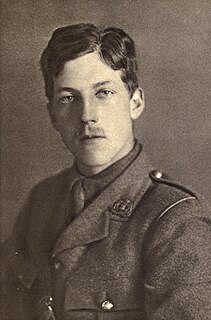
Captain Charles Hamilton Sorley was a British Army officer and Scottish war poet who fought in the First World War, in which he was killed in action during the Battle of Loos in October 1915.
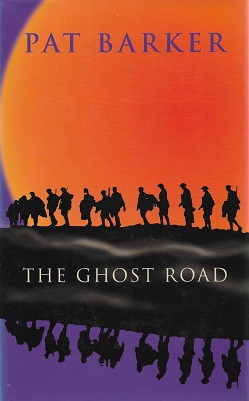
The Ghost Road is a war novel by Pat Barker, first published in 1995 and winner of the Booker Prize. It is the third volume of a trilogy that follows the fortunes of shell-shocked British army officers towards the end of the First World War. The other books in the trilogy are Regeneration and The Eye in the Door.
This article contains information about the literary events and publications of 1918.

"Anthem for Doomed Youth" is a poem written in 1917 by Wilfred Owen. It incorporates the theme of the horror of war.
Not About Heroes is a drama by Stephen MacDonald about the real-life relationship between the poets Wilfred Owen and Siegfried Sassoon first performed in 1982 at the Edinburgh Festival in Edinburgh, Scotland.

Ivor Bertie Gurney was an English poet and composer, particularly of songs. He was born and raised in Gloucester. He suffered from manic depression through much of his life and spent his last 15 years in psychiatric hospitals. Critical evaluation of Gurney has been complicated by this, and also by the need to assess both his poetry and his music. Gurney himself thought of music as his true vocation: "The brighter visions brought music; the fainter verse".
"Dulce et Decorum est" is a poem written by Wilfred Owen during World War I, and published posthumously in 1920. The Latin title is taken from Ode 3.2 (Valor) of the Roman poet Horace and means "it is sweet and fitting". It is followed by pro patria mori, which means "to die for one's country". One of Owen's most renowned works, the poem is known for its horrific imagery and condemnation of war. It was drafted at Craiglockhart in the first half of October 1917 and later revised, probably at Scarborough but possibly Ripon, between January and March 1918. The earliest surviving manuscript is dated 8 October 1917 and addressed to his mother, Susan Owen, with the message: "Here is a gas poem done yesterday ."

Craiglockhart Hydropathic, now a part of Edinburgh Napier University and known as Craiglockhart Campus, is a building with surrounding grounds in Craiglockhart, Edinburgh, Scotland. As part of a large extension programme by the university in the early 2000s the original building and surrounding campus underwent significant restoration and modernisation as a result many of the original interior features of the building are no longer visible. The exterior of the building has been preserved.
Jessie Pope was an English poet, writer, and journalist, who remains best known for her patriotic, motivational poems published during World War I. Wilfred Owen wrote his 1917 poem Dulce et Decorum est to Pope, whose literary reputation has faded into relative obscurity as those of war poets such as Owen and Siegfried Sassoon have grown.
"Insensibility" is a poem written by Wilfred Owen during the First World War which explores the effect of warfare on soldiers, and the long- and short-term psychological effects that it has on them. The poem's title refers to the fact that the soldiers have lost the ability to feel due to the horrors which they faced on the Western Front during the First World War.

Regeneration is a 1997 British film, an adaptation of the 1991 novel of the same name by Pat Barker. The film is directed by Gillies MacKinnon. It was released as Behind the Lines in the US in 1998. The film follows the stories of a number of Officers of the British Army during World War I who are brought together in Craiglockhart War Hospital where they are treated for various traumas. It features the story of Siegfried Sassoon, his open letter reprinted in The Times criticising the conduct of the war and his return to the front.
In the early years of the 20th century, rhymed lyric poetry, usually expressing the feelings of the poet, was the dominant poetic form in America, Europe and the British colonies. The relevance and acceptability of the lyric in the modern age was, though, called into question by modernism, the growing mechanization of human experience and the harsh realities of war. After the Second World War the form was again championed by the New Criticism, and in the late 20th century lyric once again became a mainstream poetic form.
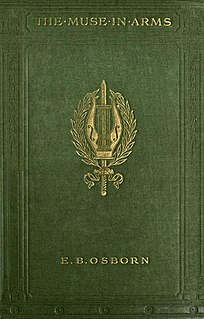
The Muse in Arms is an anthology of British war poetry published in November 1917 during World War I. It consists of 131 poems by 52 contributors, with the poems divided into fourteen thematic sections. The poets were from all three branches of the armed services, land, sea and air, from a range of ranks and from many parts of the UK. Twenty of the poets who contributed to this volume died during the war. The editor was the journalist and author Edward Bolland Osborn (1867–1938), and the book was printed in London by the publishers John Murray. This anthology was one of several collections of war poetry published in the UK during the war. It "achieved large sales", and was reprinted in February 1918. It has been referenced in several analyses of First World War poetry and has been described as "the most celebrated collection of the war years".
Strange Meetings: The Lives of the Poets of the Great War is a non-fiction book by Harry Ricketts, first published by Chatto & Windus in 2010. The book is a kind of collective biography of the major poets of World War I, in the form of documented or speculated meetings between the individual poets, covering a period between 1914 and 1964. The poets whose careers are described include Vera Brittain, Rupert Brooke, Robert Graves, Ivor Gurney, David Jones, Robert Nichols, Wilfred Owen, Isaac Rosenberg, Siegfried Sassoon and Edward Thomas. The title of the book is a variation on the title of "Strange Meeting", a poem by Wilfred Owen, which itself is taken from a phrase in Shelley's The Revolt of Islam.
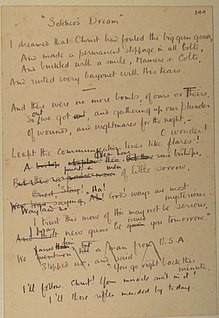
Soldier's Dream is a poem written by English war poet Wilfred Owen. It was written in October 1917 in Craiglockhart, a suburb in the south-west of Edinburgh (Scotland), while the author was recovering from shell shock in the trenches, inflicted during World War I. The poet died one week before the Armistice of Compiègne, which ended the conflict on the Western Front.

Poems was a quarto volume of poetry by Wilfred Owen published posthumously by Chatto and Windus in 1920. Owen had been killed on 4 November 1918. It has been described as "perhaps the finest volume of anti-war poetry to emerge from the War".
| Wikisource has original text related to this article: |